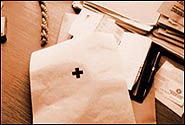 | |||||
Lucas and Mark Make a Baby
ON A WINTER'S MORNING in Santa Monica, California, two men order omelets at their local breakfast spot. Mark and Lucas have been a committed couple for more than a decade. Now they are trying to have a child with the help of two women: a surrogate mother and an egg donor. Gazing wistfully about them at tables of boisterous children, the men talk like an infertile heterosexual couple, impatient to end their long, uncertain march to parenthood. "Mentally, I've been a father as long as I can remember," Mark says. "Sitting here and seeing the little children, it's like, where's mine and when do we get started?" Lucas adds that he tries to contain the feelings of anticipation. "I don't want to get too excited because there are more steps to go through. When we're well into the pregnancy and it looks good, I'll finally jump for joy and get real excited about it," he says.
Lucas is 36, Mark is 40. Both have good jobs as medical equipment salesmen. They came out as homosexuals before meeting each other and both assumed that being openly gay meant giving up on having kids. Mark says it was those around them that revived the dream of a family. "Our parents and our neighbors were saying, 'You guys would make great parents,'" he says. After much thought, Lucas approached his sister Sandra about getting inseminated with Mark's sperm and delivering their baby. Sandra declined. "I would like to do that for my brother," she says. "I just think that would be very difficult to carry a child and give it up after carrying it. I don't think I could do that." Then a woman across the road volunteered. Lucas and Mark's neighbor, Renee, said she would carry the baby if the men could find a woman to donate eggs. Renee is 34 years old, married with two children. She and her husband are close friends with Lucas and Mark. "She's just a very altruistic person," Lucas says. "She's very special and very loving and kind. She saw we were serious about this, and how much it would mean to us, and she wants to help us." With Renee on board, the couple had another choice to make: use eggs from an anonymous donor, or ask a relative to donate. Lucas went back to his sister. This time, Sandra agreed. She liked the idea of helping her brother create a biological link to his child. "Using my egg would really be genetically a closer fit. It would be part of him," she says.
Sandra's eggs were surgically harvested and mixed with Mark's sperm in a laboratory dish. In April of this year, a Santa Monica infertility specialist, Dr. Guy Ringler, transferred five embryos to Renee's uterus. Two weeks later, Lucas and Mark waited nervously in their home office for Renee to call. She took a pregnancy test that day. The odds were discouraging. Ringler said that with frozen embryos from a woman over 40, there was just a 15-20 percent chance Renee would be pregnant. In reproductive medicine, everything hinges on the quality of the eggs, which decline with the age of the donor.
Dr. Guy Ringler of California Fertility Associates in Santa Monica is
handling the medical procedures for Renee, the surrogate carrying Mark and
Lucas' children. This was the first gay couple to approach Ringler for
infertility treatment. The phone warbled its electronic ring. Lucas and Mark each picked up an extension. "Hello?" Lucas said. "Yeah. A fax?" Just then the fax machine also rang. A message uncurled from the printer. Mark pulled it from the machine and showed it to Lucas. The sheet was blank, except for a large plus symbol at the center of the page. Mark smiled and said to Renee on the other end of the line, "Does that mean positive by any chance?" She was pregnant with their baby.
The men looked at each other with expressions of relief, joy, and astonishment. After more than two years finding an egg donor and a surrogate, searching for a doctor, studying the legal issues, and drawing up contracts, today was a triumph. But there's more struggle ahead. If and when their baby comes, Mark and Lucas face the typical parental challenges. One will quit work to be a stay-at-home dad. The guest room will get converted into a nursery. They still haven't made that all-important decision between cloth and disposable diapers. And then there are the questions unique to a family with two gay dads. When it grows old enough, Mark and Lucas will tell their child it's egg came from Aunt Sandy. So, who's mommy? "The answer is this child doesn't have a mommy per se," Mark says. "He or she will have two dads. We really do believe that a lot of love and nurturing and care and attention in a secure environment is going to carry this child through it. So when he or she asks, 'Who's my mommy?' Well... we don't have a mommy. We have some very special women in our lives, but you have two daddies." Next: Twin Controversies
|



